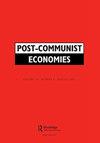Deindustrialisation in post-Soviet economies: premature deindustrialisation, Dutch disease, human capital, and institutions
IF 1.8
3区 经济学
Q2 ECONOMICS
引用次数: 0
Abstract
ABSTRACT This study examines deindustrialisation in 15 post-Soviet economies by investigating the country-specific fixed effect in the relationships among manufacturing, population, and income and the factors contributing to deindustrialisation in terms of the premature deindustrialisation hypothesis. The fixed-effect estimation suggests deindustrialisation in the ten middle-income post-Soviet countries due to their comparative disadvantages in manufacturing as the overall contributor, with the lack of human capital, the Dutch Disease effect (mainly in Azerbaijan, Kazakhstan, the Russian Federation, and Uzbekistan), and immature institutions (mainly in Kyrgyz, Tajikistan, Ukraine, and Uzbekistan) as sub-factors that explain deindustrialisation in these countries based on factor analyses.后苏联经济体的去工业化:过早的去工业化、荷兰疾病、人力资本和制度
本研究考察了15个后苏联经济体的去工业化,通过调查制造业、人口和收入之间关系的特定国家固定效应,以及根据过早去工业化假设导致去工业化的因素。固定效应估计表明,10个中等收入后苏联国家的去工业化是由于它们在制造业方面的相对劣势,而人力资本的缺乏、荷兰病效应(主要在阿塞拜疆、哈萨克斯坦、俄罗斯联邦和乌兹别克斯坦)和不成熟的制度(主要在吉尔吉斯、塔吉克斯坦、乌克兰和乌兹别克斯坦)是基于因素分析解释这些国家去工业化的子因素。
本文章由计算机程序翻译,如有差异,请以英文原文为准。
求助全文
约1分钟内获得全文
求助全文
来源期刊

Post-Communist Economies
ECONOMICS-
CiteScore
4.90
自引率
18.20%
发文量
21
期刊介绍:
Post-Communist Economies publishes key research and policy articles in the analysis of post-communist economies. The basic transformation in the past two decades through stabilisation, liberalisation and privatisation has been completed in virtually all of the former communist countries, but despite the dramatic changes that have taken place, the post-communist economies still form a clearly identifiable group, distinguished by the impact of the years of communist rule. Post-communist economies still present distinctive problems that make them a particular focus of research.
 求助内容:
求助内容: 应助结果提醒方式:
应助结果提醒方式:


